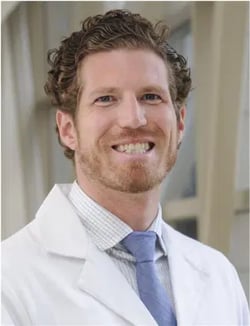University of Colorado Cancer Center member Ryan Weight, DO, MS, has always been passionate about caring for patients. However, in early April, in the middle of a global pandemic, the way he goes about patient care looks a little different.
“COVID-19 has changed the way I practice medicine significantly,” Weight says. “I only see patients in the clinic whose life depends on treatment. Most of my appointments are done via Telehealth.”
Ryan Weight, DO, MS
Like most people living in the United States, and around the world for that matter, Weight is doing much of his daily work remotely. Unlike most people, his work can be a matter of life and death.
“The pandemic has brought a number of challenges that we, as providers, have never had to deal with before,” he says. “Now we have to weigh the risks versus benefits of treating people with chemotherapy or other immunosuppressive treatments, or even look at postponing treatments to reduce the risk of infection. It’s incredibly difficult. There is not much data about the impacts of delaying treatment, so it is hard to say how this might impact survival. It is an extremely challenging time for not only me, but the entire health care system.”
At the start of his career, Weight knew he wanted to work in health care, but always imagined it would be in a lab. He studied biomedical engineering and was well underway with research when a project changed his trajectory.
“I was working on a way to detect circulating melanoma cells in the bloodstream, which included working closely with surgical oncologists,” Weight explains. “It was then that I fell in love with the field. I loved the compassion and personalized interaction that came with treating patients. I made the tough decision to leave research to practice medicine with the intent to become an oncologist.”
Although Weight graduated with an DO rather than a PhD, he still holds a special place in his heart for research. The topic of research that inspires him most? Immunotherapy.
“Immunotherapy is rapidly expanding in the medical field, and especially in cancer,” he says. “Just a few years ago there were only a couple FDA approved indications for immunotherapy medications. Now we are seeing the indications increase substantially across different tumor types. Immunotherapy is a different way to approach cancer by harnessing the innate immune system to treat the disease.”
But just as anything new can come with unforeseen surprises, immunotherapy sometimes has unexpected side-effects for a small number of patients. Because of this, Weight helped developed an immune-related adverse event (irAE) response team in his previous clinic and hopes to see it soon on our campus.
“I helped create one of the first response teams before national guidelines were created,” he explains. “As the use of immunotherapy is increasing, providers are also having to manage an increasing number of adverse reactions related to the drugs. Because of this, it is important to have a specialized team that has an interest in how the immune system interacts with healthy organs in the body.”
Immune-related adverse response teams are not available at every cancer clinic, however as the use of these treatments expands, Weight sees hope for virtual consultation teams that could extend the reach of this expertise.
“Virtual toxicity teams would be incredibly helpful for physicians and patients alike,” says Weight. “Educating patients and providers on how to respond to negative side-effects of immunotherapy could save lives across the United States.”
While ‘virtual care’ may be the next big thing in medicine, Weight is looking forward to the day he can see patients in the clinic once again.
“I believe this pandemic will change the way medicine is practiced all over the world. Telemedicine will be used more frequently, which is amazing when it comes to accessibility and expanding care,” he says. “That being said, I am ready to talk, laugh and care for my patients in person. No amount of phone calls or Zoom conferences can replace the human touch of practicing medicine.”





